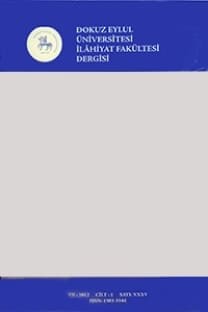DİN EĞİTİMİNE PRAGMATİST BİR YAKLAŞIM
Din Eğitimi, Pragmatist Yaklaşım, John Dewey, Dönüştürücü Eğitim Paradigması, Deneyimsel Öğrenme
A PRAGMATIST APPROACH TO RELIGIOUS EDUCATION
Religious Education, Pragmatist Approach, John Dewey, Transformative Educational Paradigm, Experiental Learning,
___
- Alberts, Wanda. Integrative Religious Education in Europe, Berlin: Walter de Guyter Publishing, 2007.
- Altaş, Nurullah. Çokkültürlülük ve Din Eğitimi, Ankara: Nobel Yayın Dağıtım, 2003.
- Ceylan, Yusuf. Yapılandırmacı Din Eğitimi Modeli: Grimmitt Örneği, DEÜ. İlahiyat Fakültesi Dergisi, Cilt 38, Sayı: 2, 2013, ss. 161-174
- D.C. Philips ve Jonas F. Soltis. Öğrenme: Perspektifler, trc. Soner Durmuş, Ankara: Nobel, 2005.
- Dewey, John. Demokrasi ve Eğitim, trc. M. Salih Otaran, İstanbul: Başarı yay., 1996.
- Dewey, John. “Religious Education As Conditioned Modern Psychology and Pedagogy”, The Religious Education Association: Proceedings of the First Convention, Chicago:Religious Education Association, 1903.
- Dewey, John. Deneyim ve Eğitim, trc. Sina Akıllı, Ankara: Odtü Yay., 2007.
- Erricker, Clive ve Jane Erricker. Reconstructing Religious, Spiritual and Moral Education, London: Routledge Falmer, 2000.
- Furat, Ayşe Zişan. “Din Okuryazarlığı: Din Eğitimi Felsefesi Açısından Temel Bir Kavram”, Marife, Cilt: 13 No: 2, Kış 2013, ss. 9-24.
- Gearon, Liam. On Holy Ground: The Theory and Practice of Religious Education, London: Routledge, 2014.
- Gergen, Kenneth J. The Saturated Self: Dilemmas of Identity in Contemporary Life, New York: Basic Books, 2001.
- Grimmitt, Micheal. Pedagogies of Religious Education: Case Studies in The Research and Development of Good Pedagogic Practice in RE, Essex: McCrimmon Publishing, 2000.
- Grimmitt, Micheal. Religious Education and Human Development, Essex : McCrimmon Publishing, 1987.
- Hay, David. “The Religious Experience and Education Project: Experiential Learning in Religious Education”, Pedagogies of Religious Education: Case Studies in The Research and Development of Good Pedagogic Practice in RE, ed. Micheal Grimmitt, Essex: McCrimmon Publishing, 2000, 70-87.
- ISSN: 1303-3344
- Yayın Aralığı: 2
- Başlangıç: 1983
- Yayıncı: Dokuz Eylül Üniversitesi İlahiyat Fakültesi
KATOLİK KİLİSESİ’NDE GELENEK ANLAYIŞI
RAŞİD HALİFELER DÖNEMİNDE MÜSLÜMANLARIN İNDUS VADİSİ İLE İLK İLİŞKİLERİ VE ASKERİ SEFERLER
Zabihur RAHMAN, TAHSİN KOÇYİĞİT
بلاغةُ الإبهامِ البَدِيعِ ي في تََْوِيهِ المعَْنَ )دراسةٌ بلاغي ةٌ في ضوءِ الت أويلِ(
TÜRK-İSLÂM EDEBİYATINDA GÜL SEMBOLÜ VE GÜL HAKKINDAKİ UYDURMA RİVAYETLERLE İLİŞKİSİ
SAHÎH-İ BUHÂRÎ’DE TEMRÎZ SÎGASIYLA AKTARILAN MUʿALLAK RİVÂYETLERİN DEĞERLENDİRİLMESİ
MU’TEZİLE KELÂMINDA BİR HAK EDİŞ OLARAK İVAZIN İLAHÎ VE İNSANÎ YÖNÜ
